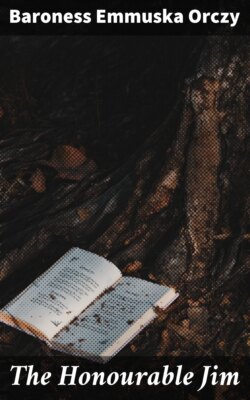Читать книгу The Honourable Jim - Baroness Emmuska Orczy - Страница 16
На сайте Литреса книга снята с продажи.
§ 1
ОглавлениеTable of Contents
In the very midst of the great turmoil of Civil War, Barbara, the girl-wife of Jim Fiennes, grew up knowing nothing of her husband. After that fateful interview in the dining-room at Stoke Lark and that last look she had of him, standing silent and obstinate at the head of the stairs, she had not seen him again. Vaguely she heard that he had fought at Edge Hill and had been severely wounded. But after that nothing more was heard of him, and those who knew the family intimately would shrug their shoulders when mention was made of Lord Saye and Sele’s eldest son. As far as the Fiennes were concerned, public attention centred for a while around the personality of Nathaniel, the second son, who had been his father’s favourite and pride until the time when he—Nathaniel—surrendered the city of Bristol to Prince Rupert almost without striking a blow and was forthwith arraigned by Parliament for treason and condemned to death. However, he was subsequently pardoned and reinstated in his command, but a good deal of mystery surrounded his rehabilitation. Lord Saye and Sele would of a surety have been too proud to sue any one on behalf of his son, whilst John, the youngest, had by his hot-headed defence of his brother done him more harm than good. As for the Honourable Jim, as many had taken to calling him, in a spirit of irony, he surely was incapable of stirring a finger on his brother’s behalf. Since then it was known that Nathaniel Fiennes, now thoroughly rehabilitated, and John, his youngest brother, were each in command of one of the regiments raised by their father. But of Jim there was no public news. What was he doing in this great conflict wherein the destiny of England was at stake and wherein all, save the wavering and cowardly, the egoist and the avaricious, took their part? Barbara did not know. She did not dare to ask. Squire Brent had forbidden the very mention of the name of Fiennes inside his house, and by his wish Barbara had discarded her husband’s name and was known as heretofore by friends and acquaintances alike as Mistress Barbara Frances Brent. To this wish she had readily acceded. Her marriage to Jim had only been a matter of convenience; she never had any affection for the man to whom she was tied in wedlock when she was scarce out of the nursery, and now that she was older she felt not a little sore at the crying injustice which had been done to her thereby. Then on her wedding day, when Jim had tried to kiss her, something in him had revolted her—child though she was at the time—and four years later, when she realised that he was a traitor to his King and had thrown in his lot with the rebel Parliament, she knew that she positively hated him. Instinct, rather than pity, had caused her on that day to stand between him and the Squire’s wrath, but that instinct had prompted her to stay the hand of a man whom she dearly loved from committing a crime rather than to try and save her husband’s life; and the oath which the old Squire extracted from her subsequently came quite readily to her lips.
Then the years rolled by and Barbara had almost forgotten that she had ever been married. Times were so troublous and the business of the State so irregular that there was little or no chance of obtaining an annulment of her marriage; it would have to stand over until happier times, when all those abominable rebels had been brought to their knees and the King had come into his own again.
In the meanwhile the garrison of Broughton Castle had been forced to surrender to the King, and the Castle was occupied by royalist troops. There was some talk among lawyers of Mistress Barbara taking possession of what was legally her home, but somehow the thought was repugnant to her and she continued to live with the Squire, sometimes at Stoke Lark, at others in Oxford with the Court and the King. Of Tubal, the son of Master Jeremiah Longshankes, yeoman, she had heard little or nothing of late. Common rumour had it that Master Longshankes had amassed a fortune by selling fodder to both armies and then had died, leaving his son in possession of the farm and some few thousand pounds, deposited at interest in the hands of a Jew pawnbroker in Banbury. The news as to this fortune lacked confirmation, but Barbara’s thoughts did often dwell upon her whilom playmate who had been her first lover, and she cherished as a fragrant flower the memory of his ardent love, of his passionate protestations and vows of fidelity, and of the scar upon his left hand which proclaimed him the blameless knight, ready to lay down his life for his mistress.
